#heinz knobloch
Text
Submitted a conference paper!
It's a little hard to believe that I'm going to get to present my passion project as actual scholarship now.
12 notes
·
View notes
Photo
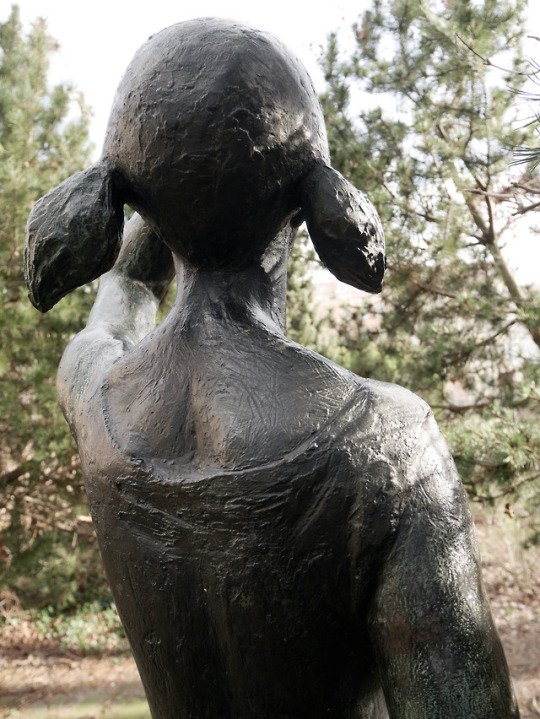
Der Rücken. / 16.02.2018
#Berlin#Pankow#Heinz-Knobloch-Platz#Gerhard Rommel#Berliner Mädchen#1962#2018#2018Februar#2018Februar16#Kunst der DDR#Kunst im öffentlichen Raum#Bildhauerei der DDR#Bronzeplastik#Bildhauerei#Skulptur
4 notes
·
View notes
Text
Auch erinnernswert ist der langjährige Feuilletonist der DDR-Zeitung „Wochenpost“ und Schriftsteller Heinz Knobloch. Sein Band „Nachträgliche Leckerbissen“ (Aufbau-Verlag, 1979) war mir eher zufällig in die Hände geraten, vor ungefähr sieben Jahren, als ich überlegte, was mit all den Büchern meiner Mutter zu tun sei, als sie nach dem Tod meines Vaters nicht mehr allein im Dorf und auf dem Bauernhof meiner Kindheit leben konnte und mochte. Ich muss wohl kurz in die „Nachträglichen Leckerbissen“ hineingeschaut haben und habe nicht eigentlich gelesen. Aber dies dieser Tage nun doch und mit (es vorsichtig zu sagen) besonderem Gewinn, wie hervorgebracht etwa durch den Text (Zitat seiner ersten Hälfte nachfolgend), betitelt
Die Schultergruppe
Im Keller der Poliklinik, wo unendliche Heizungsrohre, wie kranke Glieder eingewickelt, für eine feuchte Wärme sorgen, die fast wie Fieber auf den Stirnen der dort Sitzenden erscheint, im Keller der Poliklinik warten Patienten darauf, massiert zu werden oder ins Heilbad zu tauchen, Höhensonne wird verabreicht oder Gelenkigkeit herbeigeturnt. Dort sitzen zwölf alte Frauen und erzählen Nichtigkeiten. Nichtigkeiten? Haarsträubendes erzählen sie. Und denken, daß ich nicht zuhöre, weil ich den Blick senke, um besser lauschen zu können. Auch nehmen sie an, daß keine Begehrlichkeiten zwischen uns sind. Ihr Ahnungslosen.
Ach, ich weiß vieles über euch. Ihr seid die Schultergruppe. Und die anderen, die anderntags hier sitzen, werden „die Hände“ genannt von den Behandlerinnen. Der Teil für das Ganze. Das hat euch schon immer mißfallen, ich weiß; ihr habt eure Männer gefragt, was sie denn eigentlich an euch lieben, den Teil oder das Ganze, etwa bloß den Teil, etwa bloß das Ganze oder die Ganze, ach, die Sprache erlaubt sich Ausreden, wie keine Frau sie erlaubt. Die Sprache ist weiblich.
Die Schultergruppe, das sind alle, die an einer Gelenkentzündung litten oder den Oberarm gebrochen haben, gefallen, geprellt, seid froh, daß es nur euren Arm betrifft und nicht den ganzen Menschen, gefallen, oder den Kopf, geprellt, schrecklich Bedeutungen verdeckt der Mantel, verbirgt das Wort.
Und „die Hände“? Jede fällt für sich allein, dann wird sie hier krankengymnastisch zu einer Gruppe zusammengefasst und sitzt im Keller der Poliklinik und tauscht Erfahrungen aus. Und ich senke den Blick und denke . . . eigentümlich, was Frauen sich erzählen (...)
0 notes
Text
Da war sie wieder: eine gut gefüllte Sport- und Kulturhalle! Die Aktiven des TSV Gomaringen schafften es an diesem Januarwochenende erneut. Samstagabend und Sonntagnachmittag füllten Theaterspaß, Vorführungen, Tombola und Tanz die Kulturhalle bis auf den letzten Platz.
TSV ehrt seine “TSVler des Jahres”
Seit vier Jahren zeichnet Karin Larsen, Vorstand des TSV Gomaringen, gern die TSVler aus, die herausragend viel für den Verein getan haben. Heuer sind das Wolfgang Stahl und Gerd Strohmaier, beide langjährige Ausschussmitglieder und seit 1974 beim Verein. Stahl hat unter anderem den Frauenfußball gegründet. Er habe “seine Mädels so im Griff, dass fast alles von selber machen”, lobte Karin Larsen. So packen die Fußballerinnen fleißig bei der Papiersammlung an, und hier zeige sich: “Es kann trotz Arbeit schön sein im Verein!” Stahls großer Verdienst sei es, den Vereinsgedanken in dieser motivierenden Art zu leben und weiterzugeben.
Strohmaier dagegen ist bekannt über nun 15jährige Regiearbeit mit seiner Theatergruppe, für die er die Ehrung entgegennahm. Zu Karin Larsen soll er gesagt haben: “Wenn Du mich mal ehrst, dann musst Du wieder Theater spielen anfangen!”
Karin Larsen ehrt Wolfgang Stahl und Gerd Strohmaier als “TSVler des Jahres”
Theaterposse um den Fußball-Pokal
Beste Unterhaltung war mit dem Drei-Akter “Der Pokal muss her” vom Gute-Laune-Spezialisten Erich Koch gesichert. Hier die Kurzbeschreibung der typischen Verwirrspiel-Handlung, mit Dialogen in gewohnt schlüpfriger und landwirtschaftlicher Bildersprache (Sabine Kahlfuß als rhizinusöl-sinnliche Oma, herausragend in ihrem strohtrockenen Humor: “D’r Opa hot mi nie betroga – der sich drhoim scho et nochkomma!”)
“Das Pokal-Finale um den WFV-Pokal (und somit um den Einzug in den DFB-Pokal) zwischen dem TSV Gomaringen und dem SF Dußlingen steht an. Uwe und Egon, die beiden Vereinsvorstände, versuchen mit allen Tricks und mit Hilfe von Lioba, sich gegenseitig so zu schaden, dass das Spiel zugunsten ihrer Mannschaft beeinflusst wird.
Leider sehen das die Söhne und Fußballspieler völlig anders und lasen sich gern von den Vorbereitungen auf den Kampf von Sonja und Conny ablenken. Die Ehefrauen Klara und Inge haben derweil die Schnauze voll. Sie lassen sich von Harald, ihrer alten Jugendliebe, in die Welt der Reichen und Schönen verführen. Doch da ist oft manches mehr Schein als Sein.
Dass Oma und Opa ihren Hochzeitstag feiern wollen, interessiert anscheinend niemanden. Und als Opa – gegen Bestechungsgeld, versteht sich – zum falschen Zeitpunkt dem Hahn den Kopf abschlägt, nimmt das Unglück seinen unkontrollierten Verlauf und das Chaos bricht aus.”
Und wer gewinnt schließlich den Pokal – Gomaringen oder Dußlingen? “Keiner!!!” Michael Schwab muss am Sonntag noch lachen, als er erzählt: “Die Hexerei ging schief – Platz unbespielbar! Übersät mit Ratten und Krähen!” Die Vorstände hätten sich dann auf eine Fusion der Vereine geeinigt…
#gallery-0-6 { margin: auto; } #gallery-0-6 .gallery-item { float: left; margin-top: 10px; text-align: center; width: 33%; } #gallery-0-6 img { border: 2px solid #cfcfcf; } #gallery-0-6 .gallery-caption { margin-left: 0; } /* see gallery_shortcode() in wp-includes/media.php */
“Der Pokal muss her”
“Der Pokal muss her” – Uwe und “Hexe” Lioba
“Der Pokal muss her” – Oma und Opa
“Der Pokal muss her” – Klara und Inge
“Der Pokal muss her” – Oma und Opa
“Der Pokal muss her” – Kleine Prügelei unter Freunden
“Der Pokal muss her” – Kleine Prügelei unter Freunden
“Der Pokal muss her” – Kleine Prügelei unter Freunden
“Der Pokal muss her” – Kleine Prügelei unter Freunden
“Der Pokal muss her” – Bühnenszene
“Der Pokal muss her” – Bühnenszene
“Der Pokal muss her” – Bühnenszene
“Der Pokal muss her” – Oma und Opa
“Der Pokal muss her” – Bühnenszene
Dance-Battle der Fußballer/Innen
Für noch viel mehr gute Laune sorgte das anschließende tolle Dance-Battle der Fußballer-Aktiven und der Fußballdamen, zwischen Hiphop und Männerballett. “Echt witzig und gut gemacht” fand Gudrun Bühler. Sie genoss wie einige Gemeinde- und Ortschaftsräte am Tisch von Steffen und Claudia Heß den Abends beim TSV. Auch für die Tombola hatten sich dessen Abteilungsleiter viele Besonderheiten einfallen lassen: Neben gestifteten Top-Preisen aus dem Elektronik-Bereich gab es unter anderem zwei Eintrittskarten zu den Deutschen Junioren-Hallenmeisterschaften mit Gianni Seeger zu gewinnen.
Kulturhallen-Schwoof bis nach Mitternacht
Traditionell klang die Nacht dann mit Tanz und DJ aus. Wer sich bewegen wollte, konnte das ausgelassen tun, bis die Lichter in Gomaringen wieder angingen. Für die Aktiven war die Nacht kurz: Sie mussten am Sonntag die Halle wieder für die Nachmittagsvorstellung fit machen. Und da sollen noch mehr Besucher da gewesen sein als am Samstagabend.
(Alle Bilder: Angela Hammer)
TSV Gomaringen: Winterfeier voller Erfolg Da war sie wieder: eine gut gefüllte Sport- und Kulturhalle! Die Aktiven des TSV Gomaringen schafften es an diesem Januarwochenende erneut.
#Benny Knobloch#Claudia Strohmaier#Elke Stier#Gerd Strohmaier#Gerd Wurster#Gomaringen#Holger Mayerhoff#Isabelle Golly#Karin Larsen#Karl-Heinz Dally#Kulturhalle#Michael Schwab#Peter Renz#Sabine Kahlfuß#Sport- und Kulturhalle#Stefi Stengel#TSV#TSV Gomaringen#Uli Richter#Volker Lücke#Wolfgang Stahl
0 notes
Text
Thinking about her again (the way Knobloch introduces Mendelssohn in quasi-Homeric opposition to the absolutism of Frederick II not by highlighting his strength but his disability, turning his life into a physical contradiction to the established, bellicose narrative of 18th-century Prussia)

#im definitely not an expert in#disability studies#at least there's something going on with the significance of not fighting in#the iliad#vs in#herr moses in berlin#and the significance of the heroic epithet which knobloch refuses to grant#frederick ii#friedrich ii#moses mendelssohn#heinz knobloch#homer#classics
4 notes
·
View notes
Text
One day my two main book interests (the fictional account of a spirited conflict with God or Nature in the material realities of the whaling industry & the devastatingly intimate search for irrecoverable truth in the intimately devastated city) are gonna collide together like the milky way and the andromeda. Probably next semester. And it's gonna be
It's gonna be
HERR MOSES IN BALEEN
#Moby Dick#herman melville#Moses Mendelssohn#Heinz Knobloch#Herr Moses in Berlin#sherb's sub sub library#sherb is dumb#not being on boats
3 notes
·
View notes
Text
Me: ugh it's 4am and I can't sleep. But that's OK! Moses Mendelssohn got up early to think deep philosophical thoughts before work (& before unnamed nervous illness made it too painful to think)! I should try that!
My deep philosophical thoughts: Heinz Knobloch should be called aioli because he simultaneously makes food more interesting & makes a mess
4 notes
·
View notes
Text
Read Knobloch's memoir Nase im Wind and to justify his desertion, he cites Falstaff's speech on honor from Henry IV.
I'm a little mad because. Falstaff is making a pun. "What is honor? Air." Which sounds like Ehre, the German word for honor. He's not only questioning the validity and objectivity of the artificial construct "honor," he's demonstrating it's mutability. Also maybe making a vapor/vanity reference to the Teacher book but who isn't
But Knobloch renders the speech in German and the pun doesn't carry through.
#knobloch's self portrayal as exoneration is another problem#but he knew enough english to get puns#william shakespeare#shakespeare#henry iv#john falstaff#falstaff#heinz knobloch#sherb's sub sub library#übertrager übertreter
2 notes
·
View notes
Text
thinking about Her (the fact that in creating a cadaster of 18th-century Berlin, Heinz Knobloch has written himself into its 20th-century counterpart. He too sings of a walled city, of poets, of monuments and uncertain afterlives. He too preserves in ink and stone a place long-since grown grassy. Our lifetimes do not overlap but if I found myself on the Bebelplatz now I would stare down into a cavity he began to unearth. Knobloch's Capital of the GDR is not quite as removed from Mendelssohn's Berlin as I am from it but one day it will be. Are the countless fragments of The Wall scattered across the world the artifacts of a destroyed city or lode-stones leading inexorably back to their resting-place on a metropolitan grave)
#stan rogers is like this too#but the sea is another beast#Herr Moses in Berlin#Moses Mendelssohn#Heinz Knobloch#berlin#übertrager übertreter
4 notes
·
View notes
Text
me translating Herr Moses in Berlin

#part of the appeal of it is the shear insufficiency#not only in reacreating the time & place of Mendelssohn (& eventually Knobloch)#but in salvaging sufficient language from a scissor-studded lake#I will never have a sensitive enough ear#my tounge will never be cut out for it#but there is something that must otherwise needs be said#moses mendelssohn#moses mendelssohn a biographical sketch#alexander altmann#herr moses am alexanderplatz#heinz knobloch#herr moses in berlin#übertrager übertreter
2 notes
·
View notes
Text
symptomatic of my longstanding & somewhat disturbing curiosity that my eyes zoom in on any mention of opticians, such as on pg 17 of the Altmann biography

of all the artisanal goods produced in the 16th-19th century, glasses & other lenses seem to be coded as Jewish in contemporary literature. This pattern is particularly visible in E.T.A. Hoffman's short story "The Sandman," where the antisemitically-coded mad scientist Coppelius (a.k.a. my favorite character) reappears as a seller of magical lenses which deceive the protagonist Nathanael into falling in love with the automaton Olympia.
Within Hoffman's tale the glasses Coppelius handles are associated with the dominant eye-motif of the story & possibly with the alchemical instruments of Nathanael's father, but it doesn't offer an explanation for the broader use of glasses to feminize/racialize/demean Jewish characters in literature. Was optics a field of production not regulated by guilds with restrictive religious covenants? Was it a result of the lingering obsession with Spinoza? Something else entirely?
I know prejudice doesn't "make sense" but I wonder if there's not a term paper in here somewhere. Probably about Knobloch's symbolic inversion of the Coppelius encounters in his descriptions of Dr. Schiff within Herr Moses in Berlin.
#my favorite prof does not hesitate to explain to the class when a character from 19th century literature is an antisemitic archetype#it is somewhat harder for her to explain why they are so consistently my favorite character in the story#coppelius was minding his business doing alchemy & nathanael just happened to project all his trauma onto him#he's not even a victor frankenstein type he takes accountability for Olympia#antisemitism cw#baruch spinoza#eta hoffman#der sandmann#herr moses am alexanderplatz#alexander altmann#herr moses in berlin#heinz knobloch
6 notes
·
View notes
Text
Heinz Knobloch too is a kind of Julius Rodenberg (guy who wanders around Berlin making vague remarks with which some weirdo gets obsessed 50 years later)
2 notes
·
View notes
Text
Herr Moses in Berlin Makes a Name for Himself pt. 1
I care very much about this book for many reasons, one of which is its treatment of names and self-determination. Characters in the story often go by multiple names, including Moses Mendelssohn himself, and in my translation of Herr Moses in Berlin I have a few decisions to make about how I want to translate/anglicize the names of various historical figures featured by Knobloch.
However, I am adamant that the title of the book, Herr Moses in Berlin, remain the same in English instead of localizing to Mr. Moses or Moses Mendelssohn. This is for a few reasons:
Most anglophone readers will think of "Mr. Moses" as Robert Moses, the infamous urban planner. And while "it sucks that this city is being ripped up" is a very relevant sentiment to Herr Moses in Berlin, Robert Moses and NYC have nothing to do with it.
The implications of being called Herr are very relevant to Mendelssohn's experience of 18th-century German civil society, and readers for whom German is not their first language will, like Mendelssohn, experience the little frisson of a Fremdwort (foreign word) in their story.
According to Knobloch, "Moses" is the meaningful through-line in Mendelssohn's life.
In Herr Moses in Berlin, the surname represents the privileges and responsibilities of engaging with a state too vast and impersonal to remember your father's name. Particularly in the context of Jewish assimilation narratives, taking on a transferable family name is often the scar of a humiliating encounter with said state.
Knobloch writes the following:
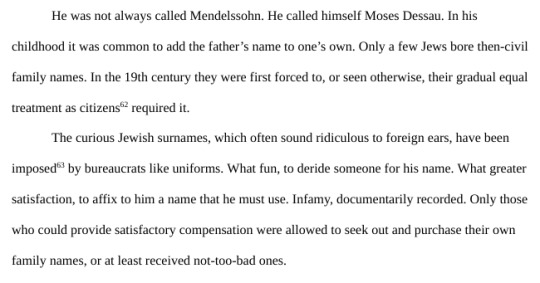
Mendelssohn's arc over the course of Herr Moses in Berlin sees him taking on the responsibilities of a public figure and an advocate for other Jewish communities in Europe, and the name "Moses Mendelssohn," itself becomes a tool in this advocacy. The persona of "the Socrates of Berlin," the author of Phaedon, and the other titles bestowed on Herr Moses are ones which he learns to catch and carry over his lifetime.
Whereas "Moses" is the name used by Mendelssohn and the people who knew him. It's latinised, of course, and figuring out whether to anglicize other names which Knobloch has already rendered in standardized German spellings is another dilemma (for a pt. 2), but according to Knobloch it is one for which he expressed a preference in his personal writings:
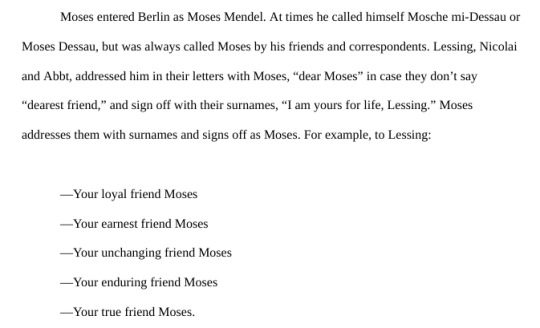
(and if that isn't just the cutest thing. I'm sorry this is a serious analytic post)
Because Herr Moses in Berlin is not just a biography of the philosopher, the maskil, the public figure. It tells the life of Moses Mendelssohn as that of a man who makes a name for himself as an intermediary between his own communities, who, despite his relative privileges, is subject to a dehumanizing system that dominates his space/time and Knobloch's, and who never stops wrestling with his religious, civil and personal duties. By calling him "Herr Moses," Knobloch is suggesting that the reader get to know him as his friends did, rather than, as the Prussian state did, merely for his services.
He also leans a little bit into the "third Moses" typology, although the references to Maimonides are usually made with reference to Mendelssohn's own frail health, rather than their interpretive significance. That's probably its own issue, though.
In pt. 2 I'm going to think about all the other figures with multiple names: Dorothea, Frederick II, etc. and how to refer to them.
2 notes
·
View notes
Text
Herr Moses in Berlin Makes a Name for Himself Part 5: in and von
As a silly little addendum to all the discussion of names in Herr Moses in Berlin, I thought the preposition in might deserve as much attention as its aforediscussed neighbords.
Heinz Knobloch absolutely loves the formulation "X person in Y place" (eg "Lessing in Wolfenbüttel," "Gleim in Halberstadt") when he's making his sentences. The German langauge has some flexibility with the order of its components so even when a person is not actually residing in a place, he can still rearrange the syntax of the sentence to invoke the title of his book. It's been very frustrating to me to have to translate things like "als das stück Lessings in Berlin auftauchte" to "when Lessing's play was published in Berlin" because this wordplay is lost, and because I think it draws attention to the distinction between being in some place and being from that place.
When Frederick II isn't being referred to as eff zwei, he's "the King of Prussia." For him, the preposition von explicates his self-fulfilling dominion over his lands, with which the Prussian monarchy had flirted for a few generations before Frederick's display of absolute(ist) power led to its widespread adoption.
By contrast, the in of Herr Moses' title denotes a less-demonstrative habitus. He and, to a lesser extent, his friends, are denied the privilege of being of a place because many of them a) are migrants and b) are denied civil rights for their religious and/or political professions. They belong to the class of subjects whose civil status is almost entirely dependent on their usefulness to the state.
And if that dichotomy isn't interesting enough, in the final 50 or so pages of Herr Moses in Berlin, Knobloch brings it to a devastating payoff when discussing Empancipation and the decisions of the Congress of Vienna:

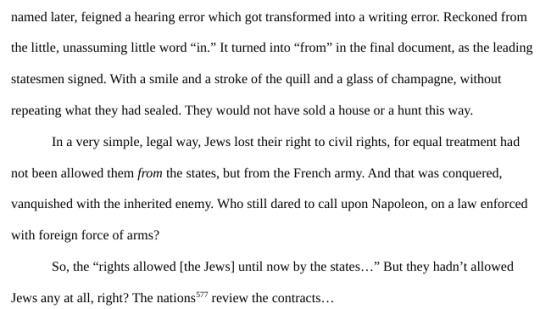
I've been playing fast and loose with my prepositions before, but in revision I think I'm going to have to be a lot more deliberate.
#herr moses in berlin#heinz knobloch#moses mendelssohn#frederick ii#friedrich ii#übertrager übertreter
1 note
·
View note
Text
Emmanuel what right have you
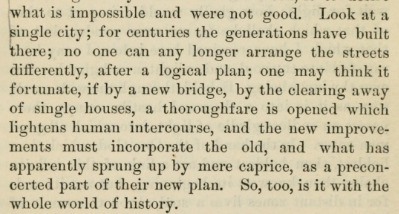
pg. 320
Heinz Knobloch also read this passage & disagreed so vehemently that it is funny
1 note
·
View note
Text
TIL Knobloch definitely read Dichter und Kaufmann & the writing teacher definitely inspired one of his digressions about education
#the content of both is a bit too hateful for me to want to feature it right now#but it's the school/shul/Judenschule as insult digression#they're so intertwined#not just in a 'prejudice & antisemitism exist throughout history' way#in a 'this book made me reckon with my own schooling' way#heinz Knobloch#herr moses in berlin#berthold auerbach#dichter und kaufmann#auerbücher
0 notes